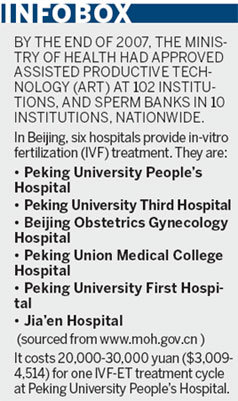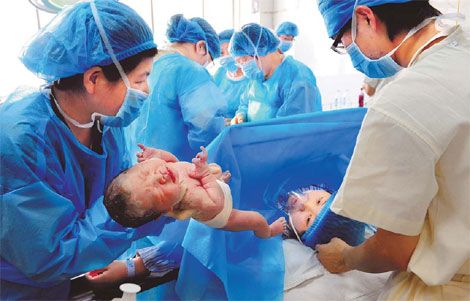Life and Leisure
Baby makers
By Lin Qi (China Daily)
Updated: 2010-10-20 08:22
 |
Large Medium Small |
|
Increasing numbers of infertile Chinese couples receive IVF treatments for a child. Yang Jingzhi / For China Daily |
Despite age-old prejudices, rising infertility rates are leading to greater acceptance of in-vitro fertilization (IVF) treatments in China.
A year ago, Dr Chen Xi received a phone call from a friend, who wanted to talk about a family crisis.
Chen's friend said she and her husband had agreed when they married not to have a child and the parents-in-law had agreed too. However, the in-laws had a change of heart and she faced the threat of divorce if she did not agree.
The women, then 41, had been taking contraceptives for years. The best time to conceive had passed.
Chen, who works at the Reproduction Medical Center of Peking University People's Hospital, Beijing, suggested the couple look at assisted reproductive technology (ART).
After a battery of medical tests at Chen's hospital, they were told the only chance they had of becoming parents was to receive in-vitro fertilization (IVF) treatment.
But doctors could not retrieve an egg from the woman's ovary, which meant the couple had to go in for a donor egg.
Luckily, another patient, with a successful pregnancy, had donated her spare eggs before leaving the hospital. One of them was later fertilized with the husband's sperm and then transferred to the wife's uterus.
The couple is now ready to welcome their test-tube baby.

ART was introduced in the country in the 1980s. In 1988, Zheng Guizhen, a 39-year-old primary school teacher from Gansu province, with an obstructed oviduct, gave birth to the country's first test-tube baby, a girl named Zheng Mengzhu, in a Beijing hospital.
"Eight to 10 out of every 100 married couples in China are diagnosed with infertility. The number of people receiving IVF treatment is snowballing," Chen says.
She says that in the first few years the center, founded in 2002, saw about 200 to 300 IVF treatment cycles annually. In 2009, the number had risen to between 800 and 1,000.
Doctors attribute the higher infertility rates among urbanities largely to late childbirth and a higher incidence of diseases causing infertility.
"The best child-bearing age for a woman is between 23 and 28. However, a number of women nowadays delay their marriage to their late 20s and try for a child in their 30s, when their fertility is on the decline," says Sha Aiguo, director of the Reproduction Medical Center of No 174 PLA Hospital in Xiamen, Fujian province. Sha has been working with ART for 11 years. Her center performs more than 1,000 test-tube baby operations a year.
"Inflammation of the fallopian tube, endometriosis and polycystic ovary syndrome have emerged as the top three diseases causing infertility in women," she says.
Sha adds that increasing mental stress from such things as competition at work, high housing prices and rising child-care expenses, as well as a deteriorating living environment, can also be linked to childlessness.
Sha recalls that when her center was first established, there was rampant misunderstanding of IVF treatment. "Since the egg is fertilized outside the human body, people felt a test-tube baby was genetically unrelated to them; they could not accept that it was as normal as one born after natural conception. Couples wanted to keep the treatment secret, because they thought it would cause them to lose face if they let it be known to relatives and friends that they couldn't have a child," she says.
Sha recalls an outburst she once heard while passing by an operation room, where a woman was delivering a test-tube baby.
An agitated mother-in-law was telling her son: "The baby cannot be considered as having the blood of our family! I won't accept it as my grandchild!"
But nowadays, with infertility rates going up, more people have become open to the idea of assisted reproduction. They also have access to more information about it from the media. "After all, this is a time when technology impacts almost every aspect of our lives," Sha says.
When Wen Yang (not her real name) and her husband took Chen's advice to receive IVF treatment, the couple felt nothing but relief and joy. Wen, 34, an office worker in Beijing, found that it was her blocked fallopian tube that was standing in the way of her pregnancy.
"We were happy to find a solution to our problem," she says. "I even joked with my husband that maybe we would have test-tube twins, because more than one fertilized egg would be placed in my uterus."
When she told her parents about their decision to undergo the treatment, they too showed support. They went to the library to read up about IVF and discussed their findings with the couple.
Sha says some people in Fujian's southern region still embrace the notion that boys are superior to girls. Women, who have had a girl and are ineligible for a second child, come in for IVF treatment, with secondary infertility caused by age and/or disease.
"They beg in tears, saying only a boy can secure their status in the family. But we can't break the law," Sha says.
She also says that despite the many complicated, and sometimes painful, procedures women undergo to become a mother, "some husbands show impatience with the treatment and no tenderness for their wives".
Sha stresses the importance of educating youngsters about childbirth.
"Many women are sterile because of multiple abortions. The more people know about how to protect themselves while having sex, the less they will have to suffer the agony of childlessness in future," she says.
